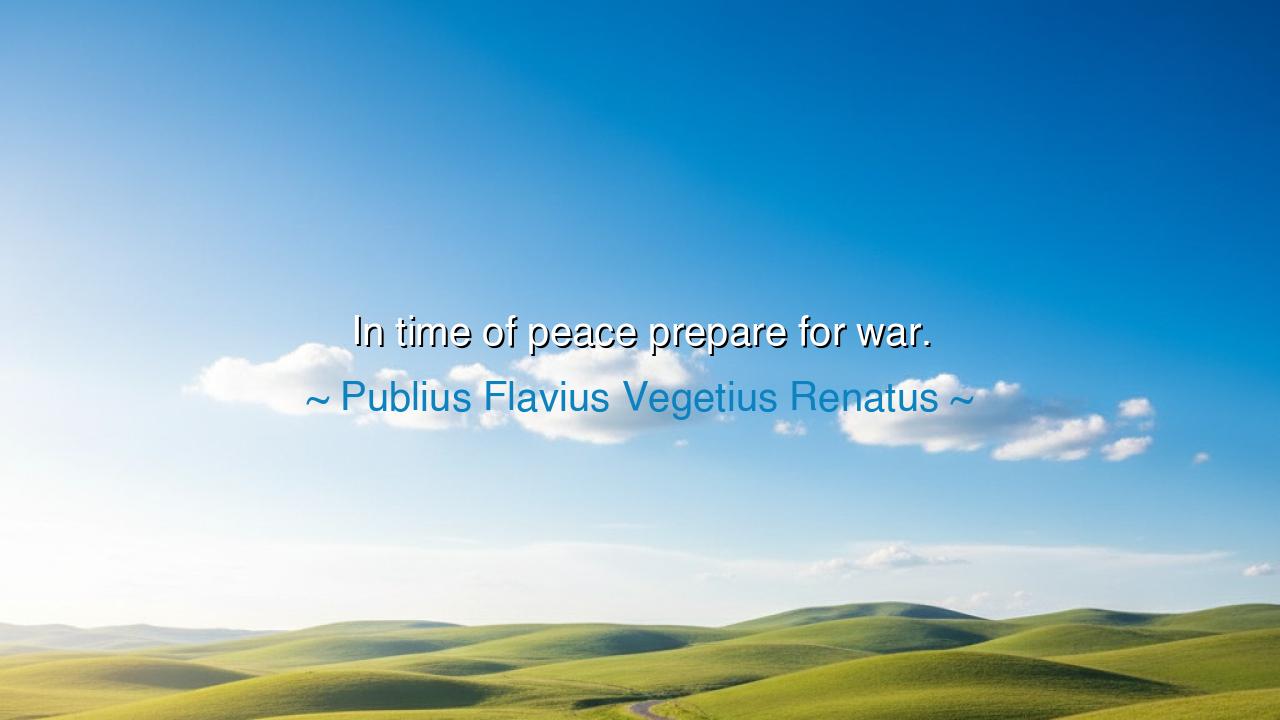
In time of peace prepare for war.






The words of Publius Flavius Vegetius Renatus—“In time of peace prepare for war.”—were forged in the crucible of the late Roman Empire, an age when decline crept like a shadow upon the once-mighty legions. Vegetius, a Roman writer of the 4th century, composed his work De Re Militari as both warning and wisdom: nations fall not because enemies are invincible, but because vigilance wanes in times of ease. His counsel is not a hymn to violence, but a stern reminder that peace is preserved only when strength is maintained.
To the ancients, this truth was plain. They knew that peace is fragile, a delicate balance of discipline and readiness. When men grow comfortable, when the sword rusts in its scabbard and the soldier forgets his drill, enemies gather strength at the gates. Vegetius’ words remind us that peace is not the absence of conflict but the fruit of constant vigilance. For war does not ask permission to come—it comes as thief or storm, and only those prepared in calm seasons will endure it.
History offers us countless examples of this wisdom. In the years before World War II, many nations, weary of conflict, neglected their defenses, hoping that treaties and good will would preserve peace. But when the armies of tyranny rose, those who had failed to prepare found themselves swiftly overwhelmed. By contrast, Britain’s steadfast preparation of its air force—the Royal Air Force—allowed it to endure the Blitz and turn the tide in the Battle of Britain. Truly, their preparation in peace became their salvation in war.
Even in Rome itself we see both the wisdom and folly of this truth. In her early days, Rome’s discipline and training made her invincible. Every soldier was drilled, every defense maintained, and thus her legions conquered the world. But in her later years, when luxury softened her people and vigilance waned, her armies grew weak. Enemies once unthinkable breached her walls, and the empire crumbled. Vegetius’ counsel was a desperate plea: do not let ease blind you to danger, for the fall comes swiftly to the unprepared.
Beloved listener, the meaning is not only for nations but for individuals. Life itself is a battleground of trials and hardships. In seasons of calm, you must still train your mind, your body, your spirit. For the day will come when storms arise—loss, failure, betrayal, or hardship—and only the one who has prepared in peace will stand unbroken. To live always in readiness is not to live in fear, but to live in strength. Discipline in quiet days ensures courage in dark ones.
The lesson for our lives is clear: do not waste times of calm. Use them to sharpen your skills, to strengthen your soul, to build reserves of wisdom and courage. Do not say, “I will prepare when hardship comes,” for by then it will be too late. The warrior trains in sunshine for the battles of winter; the wise man saves in abundance for the famine to come. Preparation is not pessimism, but the highest form of hope.
Practical wisdom demands action: rise each day with discipline, even when the world seems calm. Train your body to endure, your mind to reason, your heart to remain steadfast. Save resources, cultivate knowledge, and keep your relationships strong, so that when crisis comes you are not found empty-handed. In every peace, sow the seeds of strength, so that no storm can uproot you.
So let the words of Vegetius echo through the ages: “In time of peace prepare for war.” Take them not as a call to conquest, but as a shield against the trials of fate. For the wise know that storms are certain, but ruin is not. Victory belongs to those who prepare in silence, who train in calm, and who meet the day of battle not with panic, but with readiness.






AAdministratorAdministrator
Welcome, honored guests. Please leave a comment, we will respond soon